This is the fourth of a four-part series of stories written by students at Cumberland Middle School, who have researched and sponsored a historical marker related to the history of the Lucyville community.
Part 1 looked at the origin of the community and scholar athlete Theodore T. Coleman.
Part 2 details the life of family of Shed Dungee, whose descendants included the first African American elected to the South Carolina state legislature in the 20th century and later the first African American state Supreme Court justice in that state. He eventually became chief justice.
Part 3 answered how a Confederate Veteran was laid to rest on a formerly enslaved man’s land.
During the 2022-2023 school year, Cumberland Middle School students submitted a successful application for a “Lucyville” Virginia Historic Roadside Marker. On June 15, 2023, the Virginia Department of Historic Resources formally approved the following historic marker text and location.
The Rev. Reuben T. Coleman, enslaved at birth, became an entrepreneur after the Civil War. About 1.5 miles north of here he established Lucyville, named for his daughter, which in the 1890s featured a bank, post office, newspaper, and mineral springs resort that drew visitors from afar. Coleman, who challenged segregation, was the pastor of Mount Olive Baptist Church and a local Republican leader and officeholder. His brother-in-law Shed Dungee, formerly enslaved, represented the area in the House of Delegates (1879-1882) and aligned with the Readjusters, a biracial coalition that achieved major reforms and supported public education. Many Lucyville residents left during the Great Migration.
Sponsor: Cumberland Middle School
Locality: Cumberland County, VA
Proposed Location: Trents Mill Road (Route 622) at the intersection with Oak Hill Road
This is the final article in a four-part series of stories collaboratively written by the seventh and eighth grade History Power-up classes at Cumberland Middle School leading up to the Lucyville Historical Roadside Marker Unveiling in April.
This summary article of the Chronicles of Lucyville Story Map is an oral and primary source history of the Dungee and Coleman families of Cumberland County. The following text was collaboratively written by Marlie Alvarez, Salonna Robertson, Mikayla Walton, William Trevillian, Trevor Hurtt, Brooklyn Gale, Abigail Lawson, Isaac Sysko, Xavier Bland, Audrey Dickstein, Alana Jackson-Lewis, Barry Jones, Nathan Paschall, Christian Recktenwald, Christian Davies, Noah Lemle, Karson Kidwell, Iziah Brown, Walker Hearn, Christian Recktenwald, Bri Joplin, Joey Haigh, Makayla Hall, Roger Jamerson, Gideon Stone, Owen Gold, Kavion Randolph, Chloe Buckner and Hailey Frank.
* * * 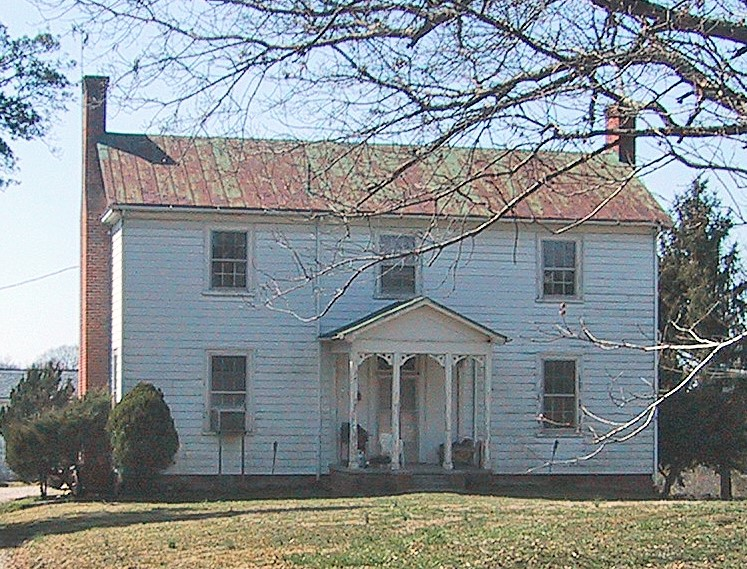
Dungee/Finney family oral history states Shed Dungee was born enslaved on December 25, 1831, at the Oak Hill Plantation. He traveled to Richmond when his enslaver, William M. Thornton, was elected to the General Assembly. He had a wife and two daughters who were later sold to Mississippi. People who were enslaved were not allowed to go to school. After the Civil War, he got an education at a freedmen’s school. Freedmen’s schools were set up to educate formerly enslaved people and were around until the early 1870s when Virginia public schools were established. Shed Dungee was a cobbler and a Baptist preacher. 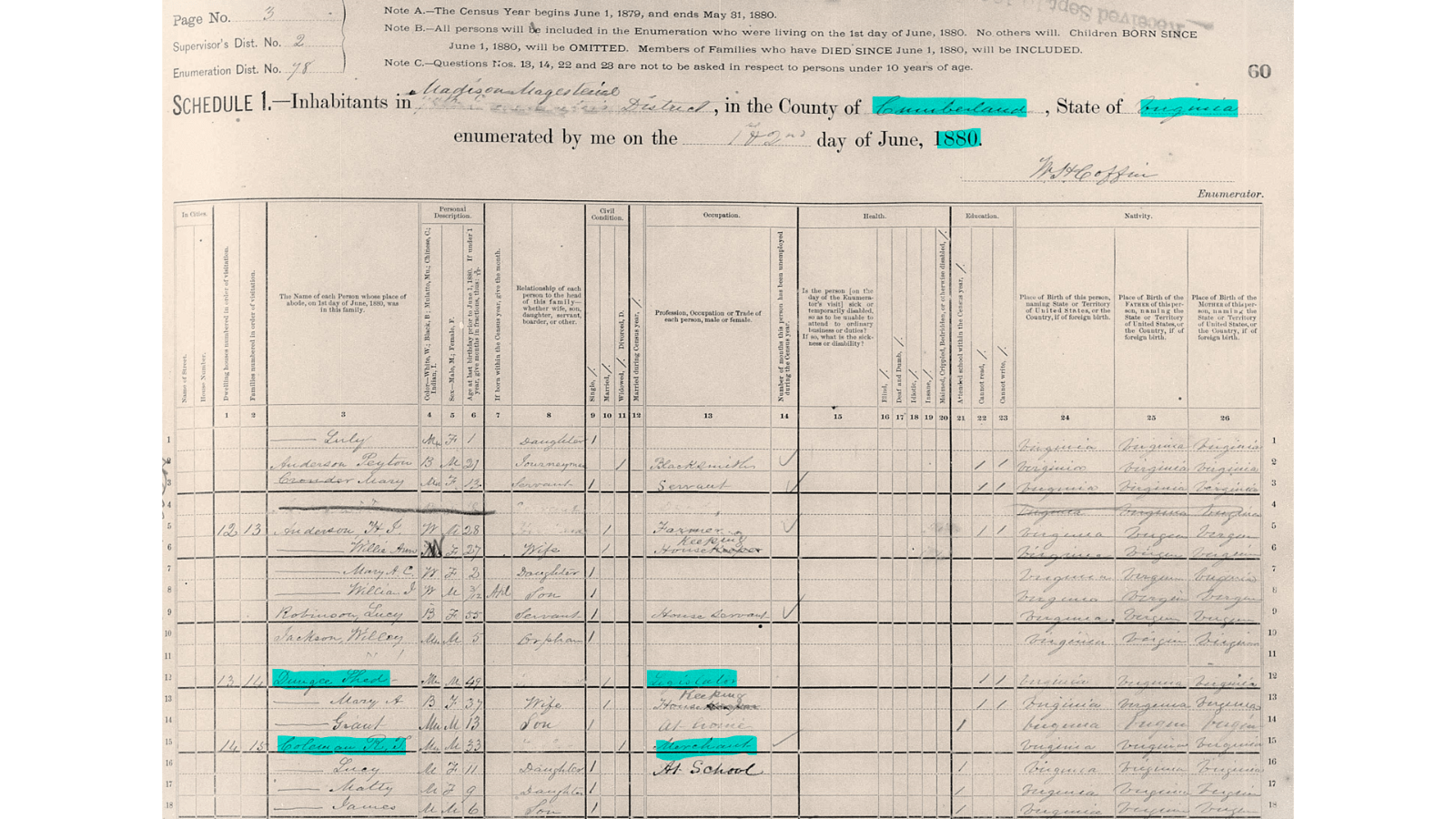
In 1869, Shed Dungee and Mary Agnes Coleman got married. Mary Coleman Dungee was the Rev. Reuben T. Coleman’s sister. R.T. Coleman was born enslaved and freed by his enslaver in 1860. He was the founder of the Colemanville Mineral Springs and the Lucyville Community. Lucyville was named after his daughter who died at a young age. 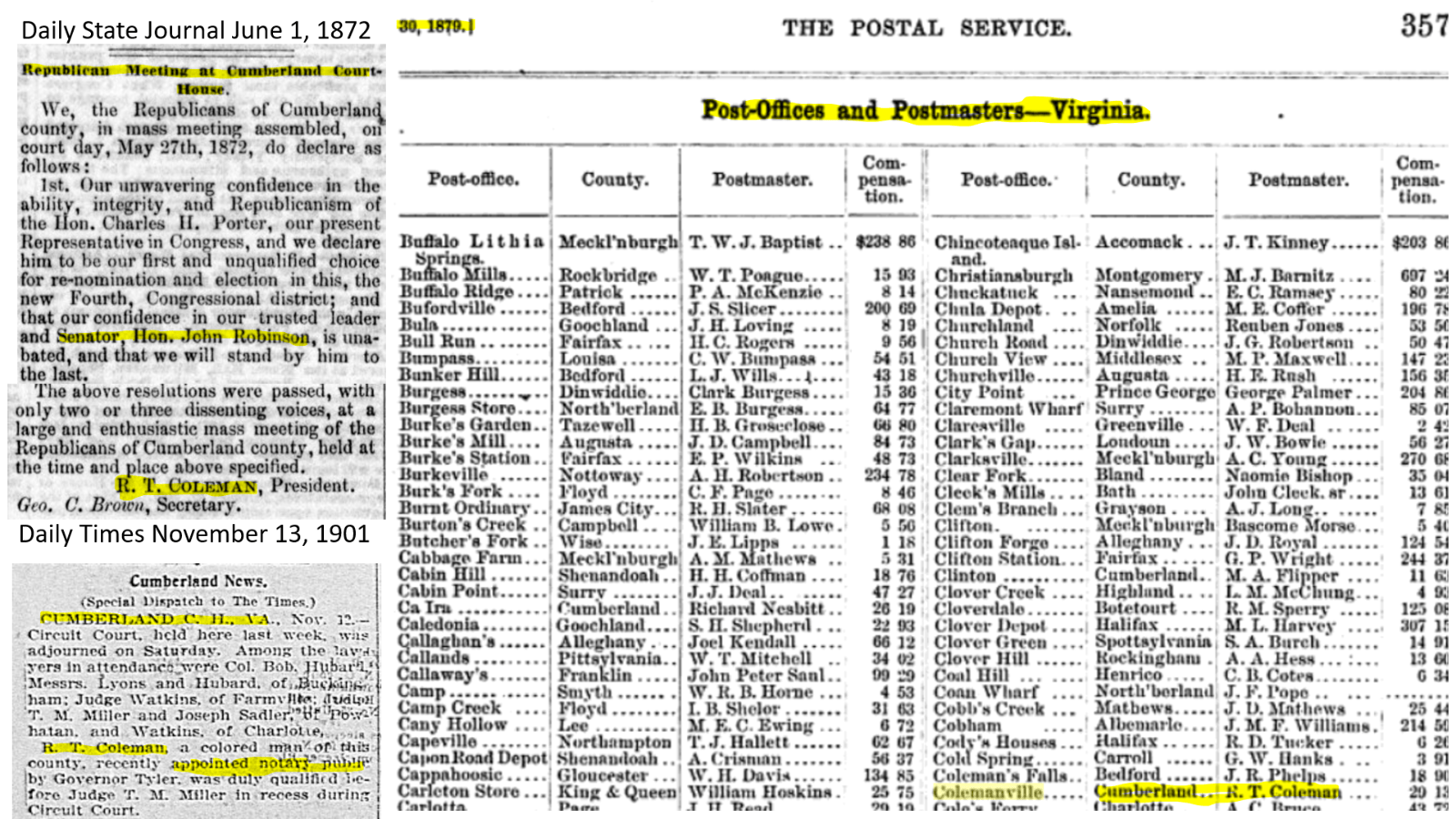
Reuben T. Coleman was a local Republican leader during Reconstruction. He served as the “President” of the Republican Party of Cumberland County. He was the Lucyville postmaster from June 1876 until July 1881. He was also Justice of the Peace and a Notary Public. 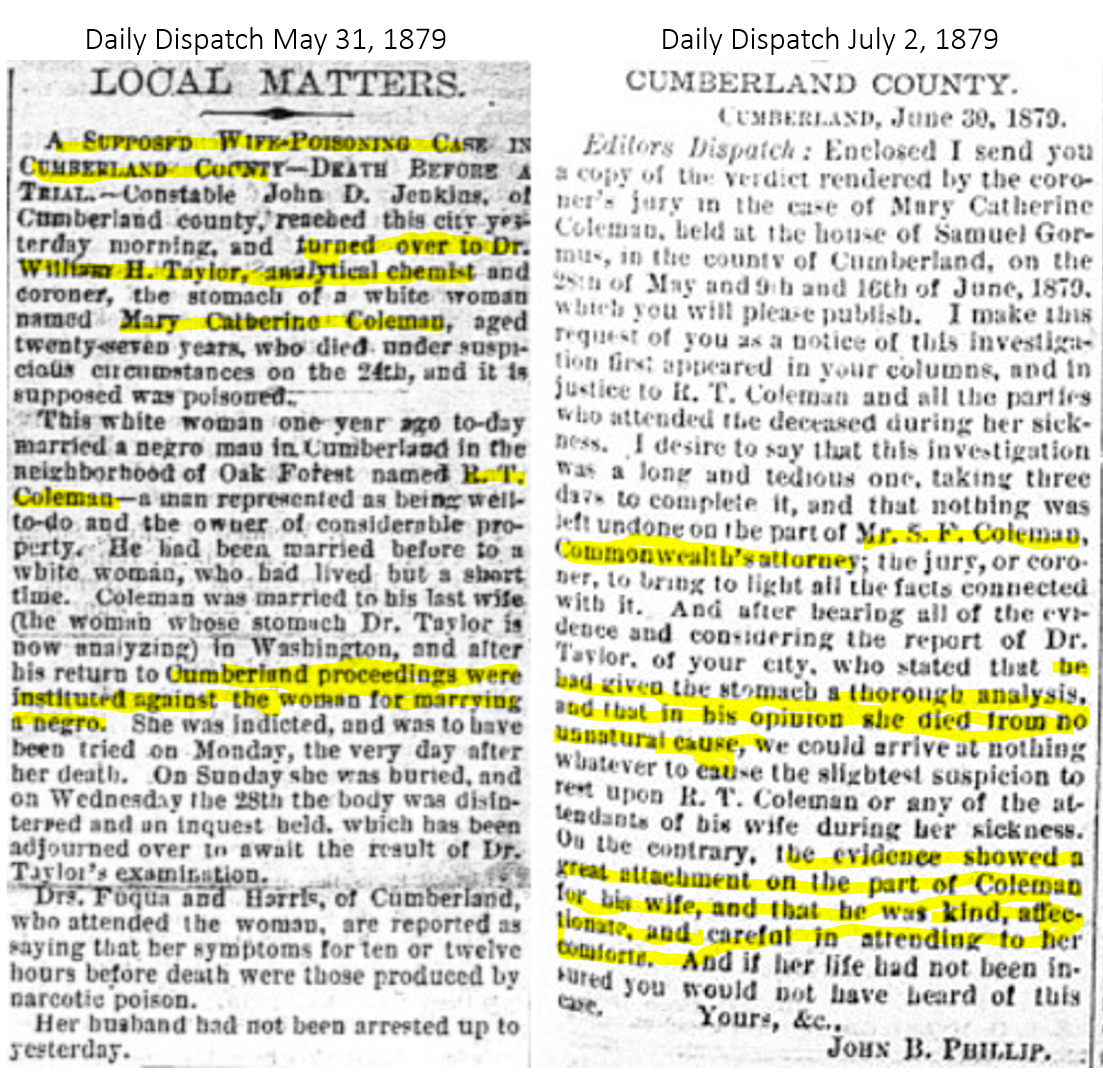
He personally challenged segregation. He married three white women in his lifetime, which at the time was against Virginia law. After the death of his second wife, he was arrested and accused of poisoning her. The state chemist, Dr. William Taylor, tested her for poison and found no evidence of it in her system. 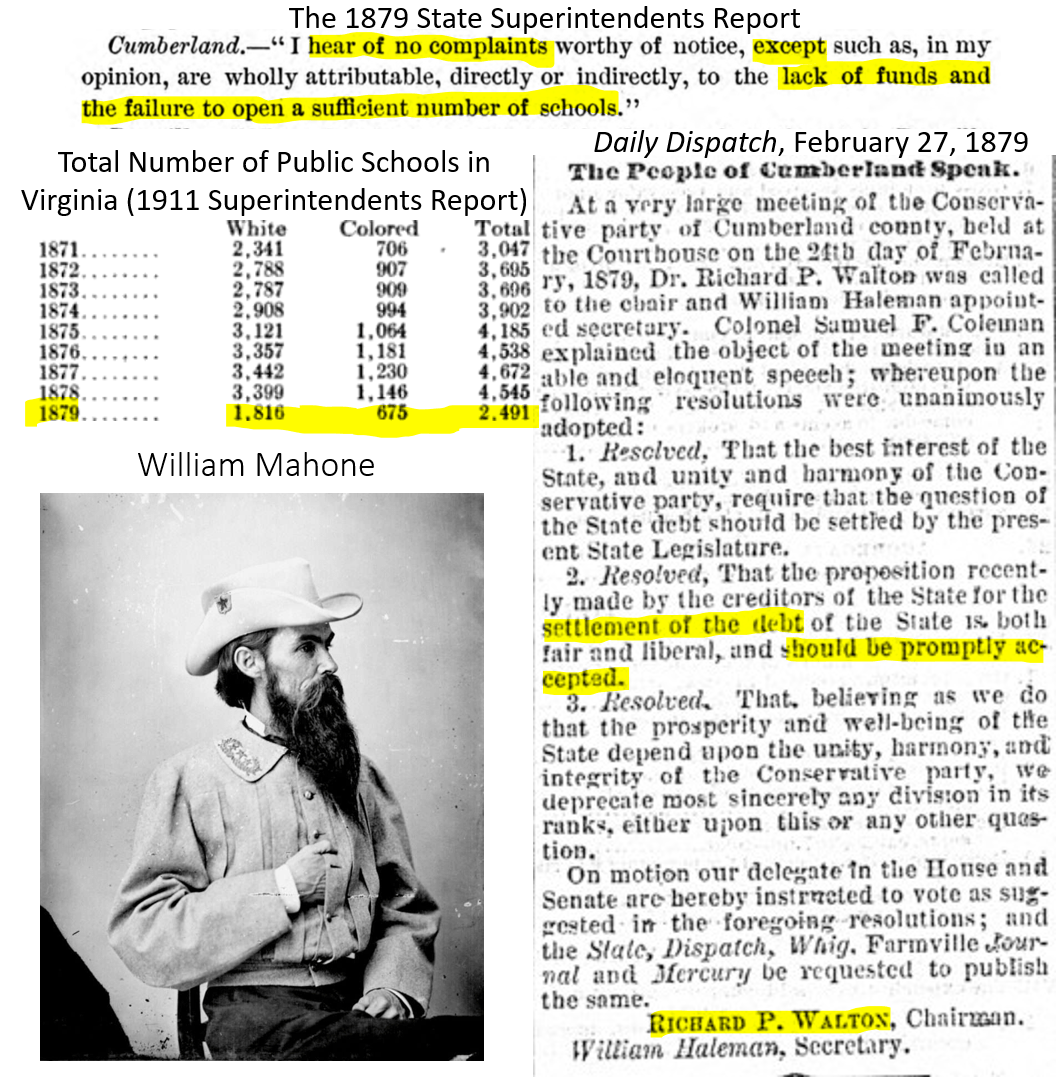
The same year R.T. Coleman’s second wife passed away, Shed Dungee ran for the House of Delegates as a Republican. That year the big election issue was the state debt. The Democrats who were in control of the General Assembly began paying off the State Debt by closing schools. Cumberland’s first school superintendent, Richard Walton, was also the chair of the “Conservative” (Democratic) Party of Cumberland County. He was a “Funder” who supported closing schools to pay off the state debt. The Readjuster political coalition made up of moderate Democrats and Republicans was started in response. The leader of the Readjuster Party was former Confederate General William Mahone. They wanted to pay less of the debt to pay for schools. 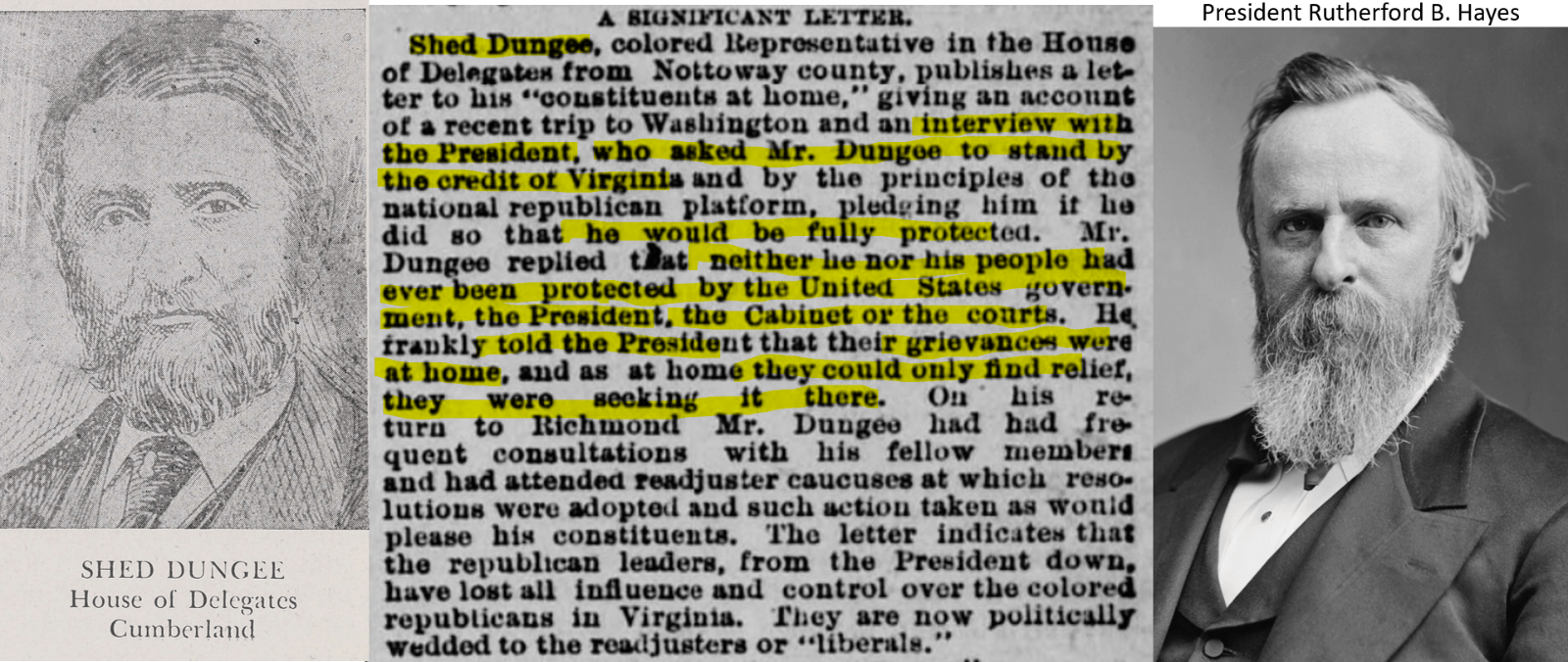
After Shed Dungee won election to the General Assembly, he met with President Rutherford B. Hayes. Rutherford B. Hayes became President due to the Compromise of 1877. This was a betrayal to the African Americans of his political party because the end of Reconstruction led to Jim Crow laws and poll taxes. President Hayes wanted Dungee to be a “funder” and vote to pay the state debt in full. Dungee disagreed and told the president he was joining the Readjusters. He represented Cumberland and Buckingham counties in the House of Delegates from 1879 to 1882. He supported public education and voted to establish Virginia State University. After serving two terms in the State Legislature, his son, Grant A. Dungee, and daughter, Nannie Dungee Finney, became public school teachers. 
In 1880, Dungee proposed making interracial marriage legal, which was voted down. Richard G. L. Paige, an African American delegate, stated before the vote, “We can’t expect to get all our rights in five minutes. Because I fail once there is no reason I should give up my trial for liberty. While there is life there is hope. I know the bill is going to be dismissed but we don’t give it up; it will come right in due season.” Interracial marriage would remain against the law until the 1967 Loving vs. Virginia case. 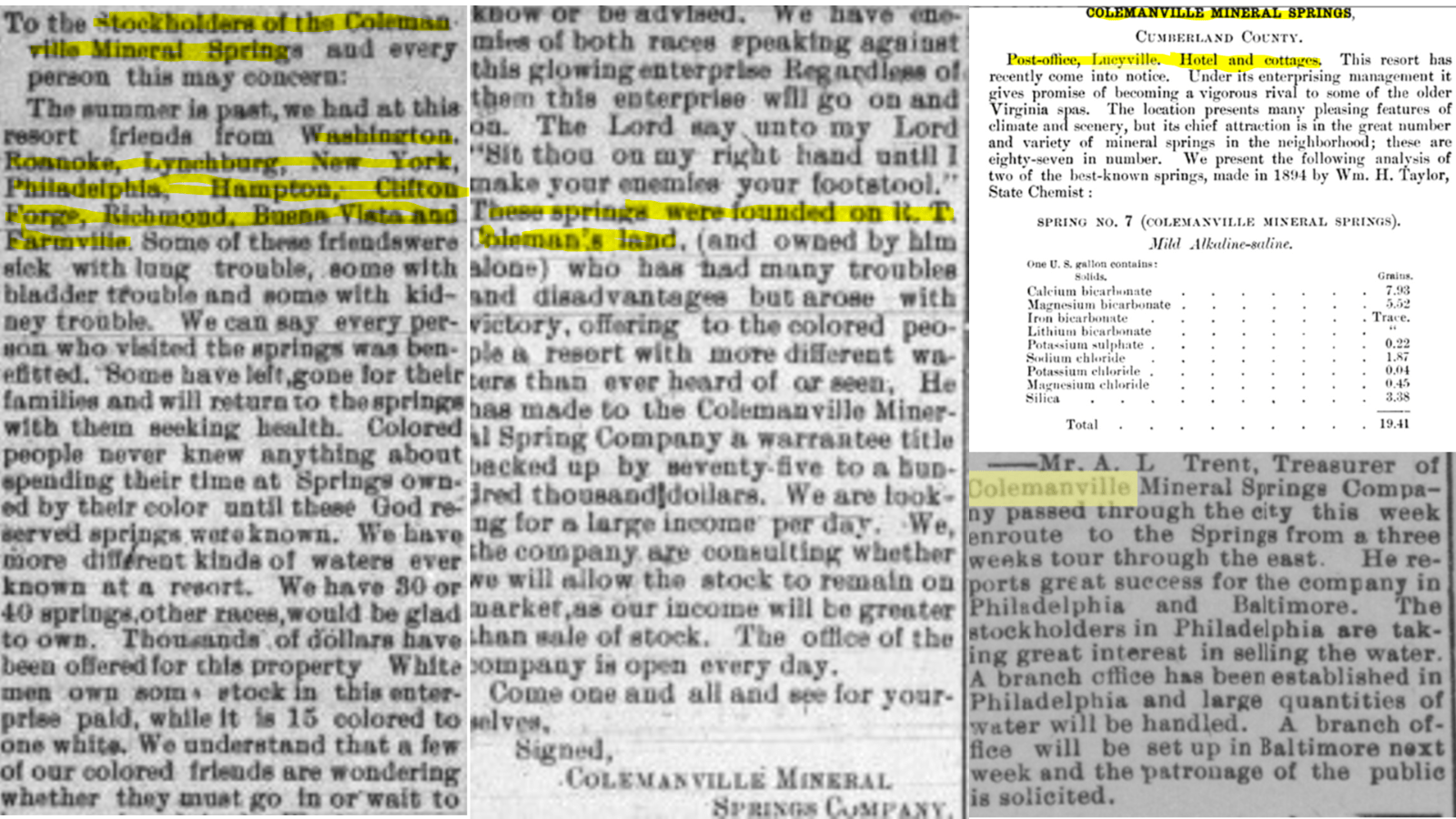
R.T. Coleman incorporated the Colemanville Mineral Spring in the early 1890s and served as the president. His resort had white and Black customers at its cottages, restaurants, hotel, and bank. Its spring water was shipped to major cities and Dr. William H. Taylor tested the spring water. He was the same chemist that tested R.T. Coleman’s second wife’s body for poison after her death. 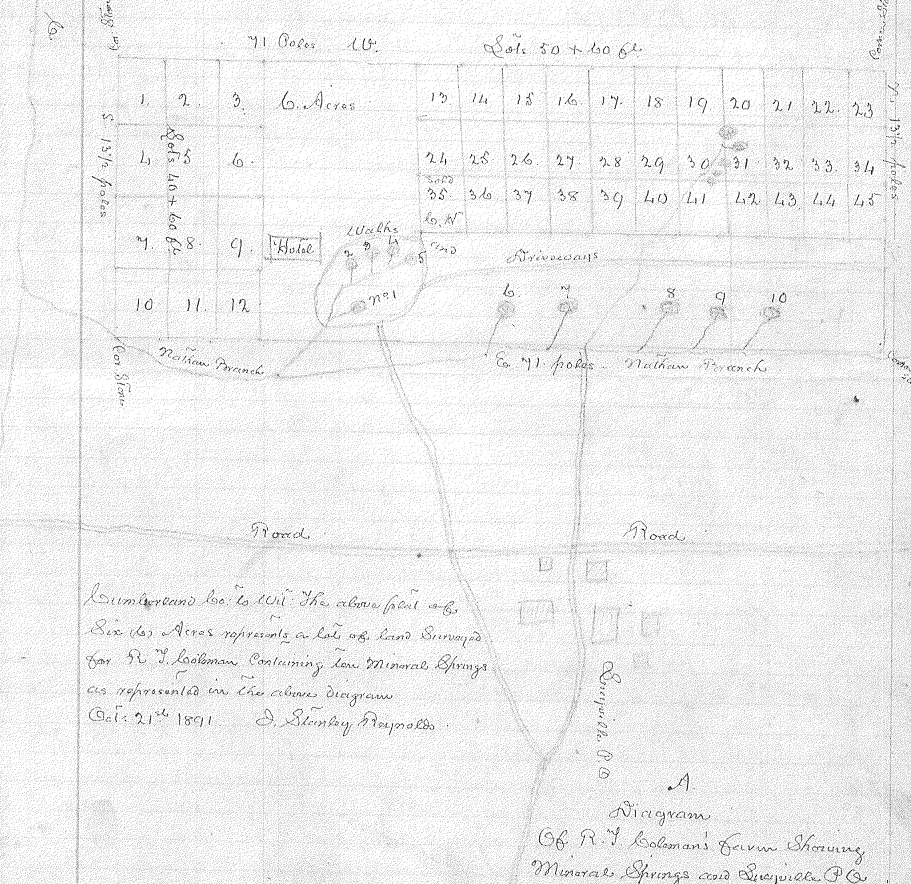
Memories of the Colemanville Mineral Springs
“Number One was one of the main springs, some time ago…Then they had Number Seven…. Number Seven changed color. You can see where the sidewalk, well the old cedar trees were lined up beside each street, these rows of cedar trees leadin’ over to the spring.… They had a big grove, springs here, one or two down there; half mile further, was still one more; and back in the hillside they got couple more. And anyhow, it went up to spring Number Thirty-nine. I can remember is that they had the bank, and this great big vault was sittin’ in there, and [R. T.] owned the vault! People put their money in there. Also, there was a Hotel, I can remember runnin’ through it; I was a little teeny fella… it looked to be the longest hall I ever saw in my life.” – Theodore T. Coleman (Abridged quote from Marilyn M. White, “We Lived On an Island”: An Afro-American Family and Community in Rural Virginia, 1865-1940) 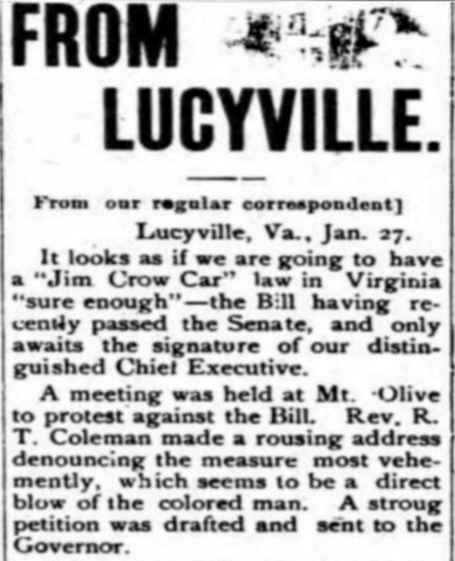
R.T. Coleman preached against Jim Crow laws as the founding pastor of Mt. Olive Baptist Church. The Jim Crow Car law was one of the many Jim Crow laws that was eventually passed after the Plessy vs. Ferguson court case. The law established segregated seating on Richmond street cars. One year after R.T. Coleman mailed a protest letter to Governor James H. Tyler, he was appointed a Notary Public by the governor. 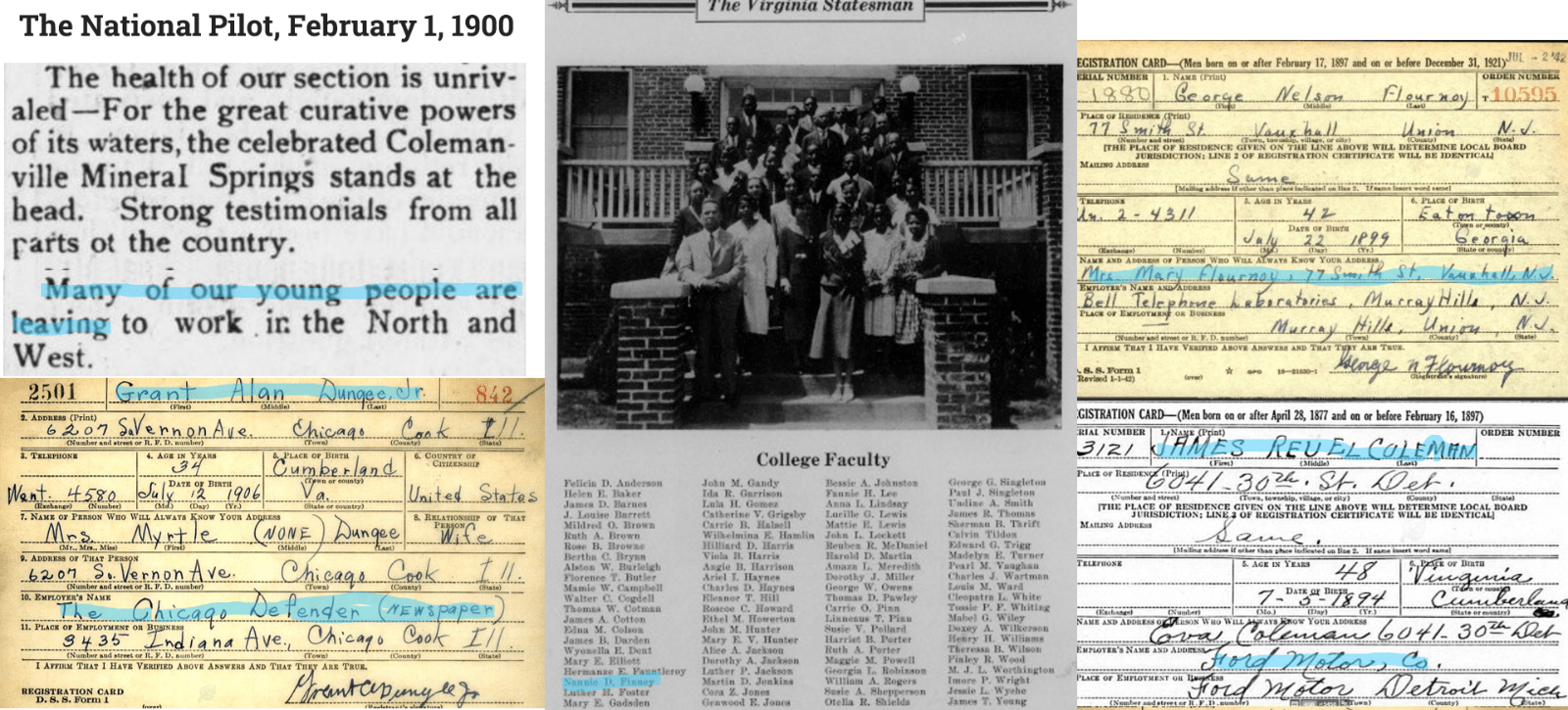
Many Lucyville residents left the area with the Great Migration. Many young people moved to work in north and western cities. They made an impact in the educational, legal, automotive, athletic and newspaper industries. 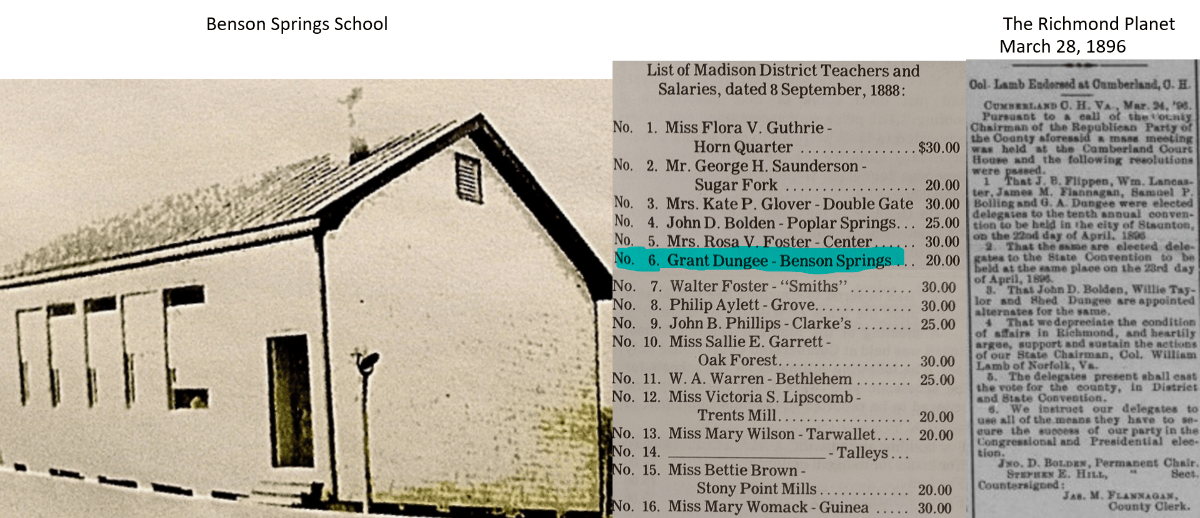
While many residents left with the Great Migration, Grant Dungee remained in Cumberland. He began teaching for Cumberland County Public Schools around the age of 20 at the Benson Springs School. He was politically active as a delegate at the 1896 Virginia Republican Convention and in his media role. 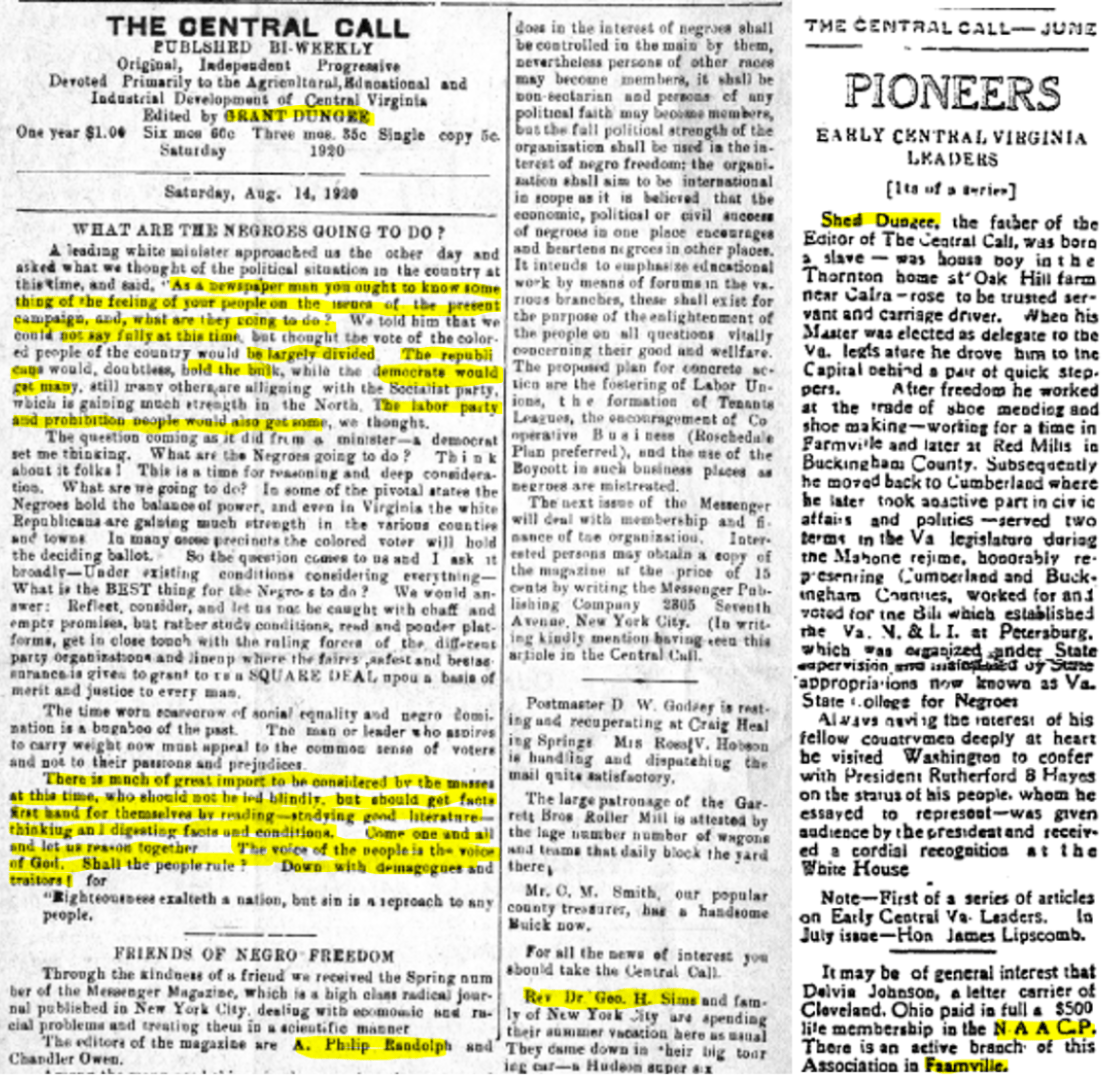
Grant Dungee was the editor of Cumberland’s first Newspaper, The Central Call. In the August 14, 1920, Central Call, he wrote about the upcoming election. This was the first election that both men and women could legally vote, yet most African Americans could not because of poll taxes and literacy tests. His front page editorial noted that the political landscape was changing.
In 1879, his father, Shed Dungee was elected as a Republican to the Virginia General Assembly and uncle was the “President” of the Cumberland County Republican Party. In 1972, his great-nephew, Ernest A. Finney, ran as a Democrat when he became the first African American elected to the South Carolina State Legislature. In the same newspaper edition, he mentioned A. Philip Randolph and the Rev. George H. Sims. Randoph, a labor leader and civil rights activist, founded the nation’s first major Black labor union. He helped to end racial discrimination and segregation in the United States armed forces and helped organize the march on Washington in 1963. The Rev. Sims, a Cumberland County native and founding pastor of Harlem’s Union Baptist Church, helped fund the first African American high school in Cumberland County, the Cumberland Training School. In New York, Sims and his congregation made efforts to help Black business efforts in property ownership. Sims helped Black renters who had been exploited by white landlords. He began the Sims Union Realty Company, which led to the church membership buying four apartment buildings. 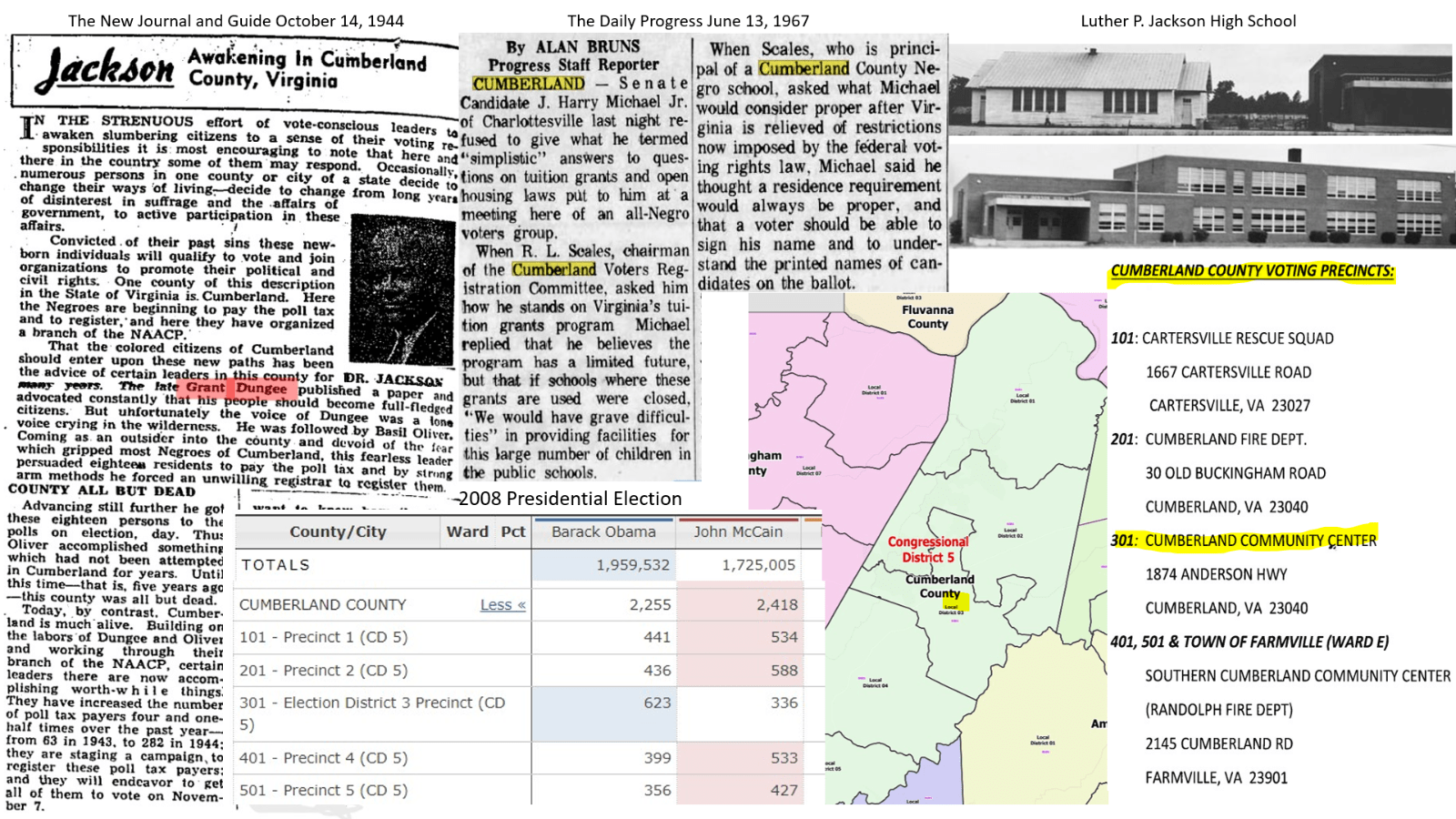
Luther P. Jackson was a Virginia State University history professor who worked with the NAACP to register voters. He was active in a leading African American scholarly organization led by Buckingham County native, Carter G. Woodson. The Association for the Study of Negro Life and History was responsible for what would eventually become Black History Month. On October 14, 1944, Luther P. Jackson named Grant Dungee in a New Journal and Guide newspaper article about voting rights in Cumberland County. Luther P. Jackson stated, “The Late Grant Dungee published a paper and advocated constantly that his people should become full fledged citizens but unfortunately the voice of Dungee was a lone voice crying in a wilderness.” In 1952, the new African American school in Cumberland County was built about two miles from the plantation where Shed Dungee was enslaved. It was constructed beside the Cumberland Training School and named Luther P. Jackson High School. Robert L. Scales, the school principal, was politically active as the chairman of the Cumberland Voter Registration Committee. After Cumberland County Schools integrated, the building became Cumberland Elementary School, of which Scales was principal. The former Luther P. Jackson school building is now a community center and a voting precinct location. 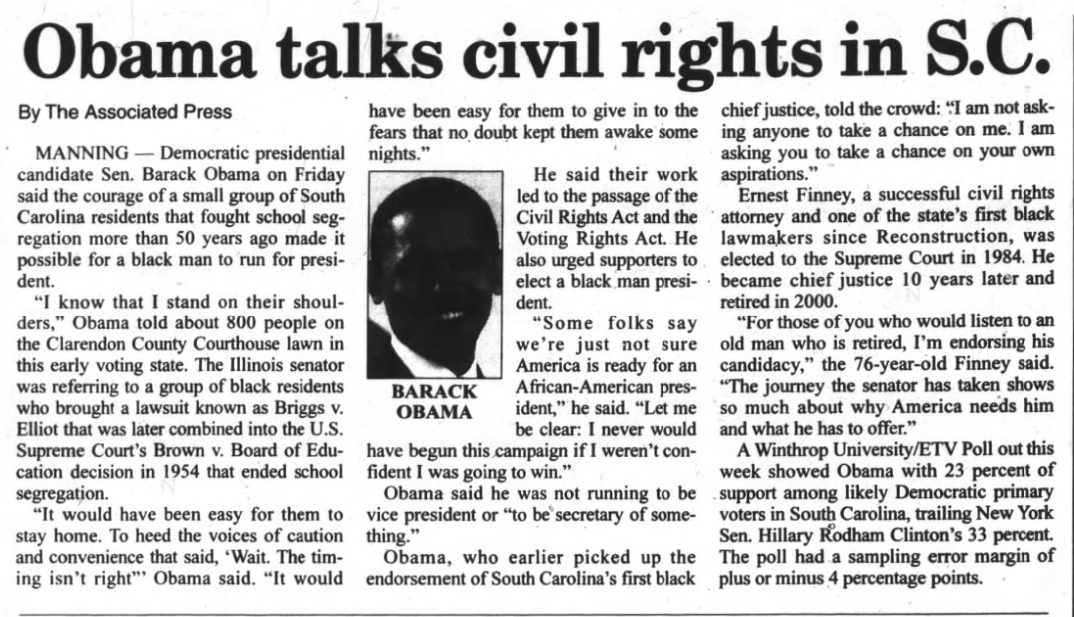
When Ernest A. Finney, Jr., endorsed Barack Obama for president, he was trailing Hillary Clinton in the polls in the South Carolina primary by 10%. Obama spoke at the Clarendon County, SC, Courthouse the day Finney endorsed him. Clarendon County and nearby Prince Edward County, VA, are significant because both communities were part of the Brown vs. Board of Education case. Barack Obama won the 2008 South Carolina Democratic Primary and the Democratic nomination and became the nation’s first African American president. 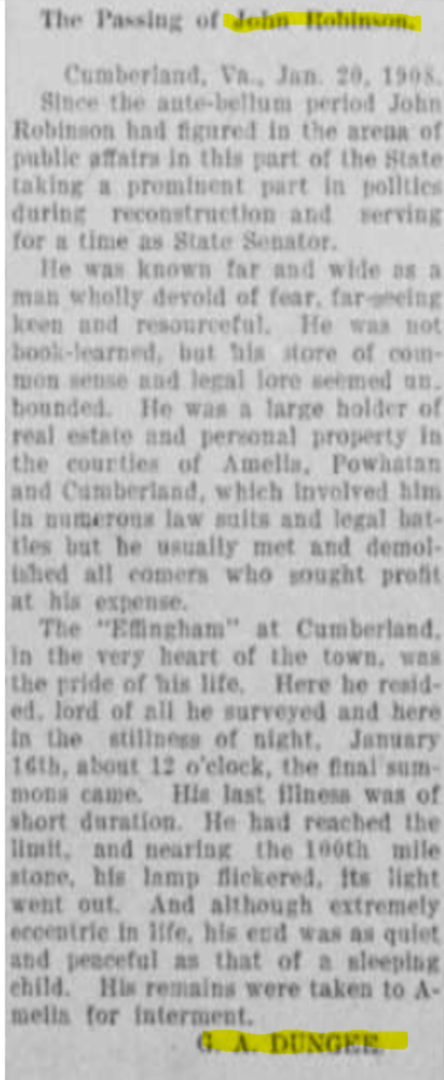
Grant Dungee wrote articles for many newspapers. He wrote John Robinson’s front page obituary for the Richmond Planet. The Richmond Planet was a major African American newspaper known throughout the South. John Robinson was a free African American before the Civil War who was elected to represent Cumberland County in the 1868 Virginia Constitutional Convention and the Virginia Senate. October 2023, Cumberland Middle School students determined on the text and a proposed location for the John Robinson Historic Roadside Marker Application. It is up for formal approval at the next Department of Historic Resources Quarterly Meeting in a few weeks.



